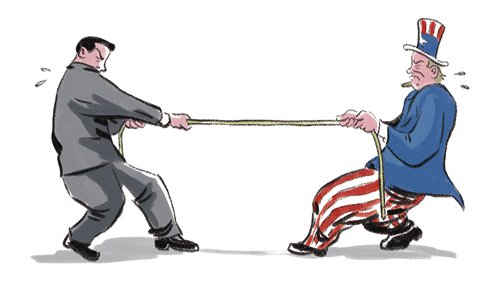
Illustration: Liu Rui/GT
Forty years ago on January 1, 1979, China and the US formally established diplomatic relations. Today with the narrowing gap of strength between the two countries, the bilateral relationship has come to a crossroads.
Concerns about the current state and prospect of the China-US ties are pervasive among scholars of both sides. At a recent seminar in Beijing, Graham Allison, Douglas Dillon Professor of Government at Harvard University who coined the term "Thucydides Trap," described the bilateral relations as "very troubled." Yuan Peng, Vice President of the China Institutes of Contemporary International Relations, said if an all-out cold war or an economic cold war is unlikely between China and the US, a high-tech cold war has actually begun.
China-US relations are facing unprecedented challenges. The trade war and the arrest of Meng Wanzhou, chief financial officer of Chinese tech giant Huawei, have undermined the two foundations of the relationship, namely economic and trade relations that used to be the ballast of the bilateral relations and the people-to-people exchanges. The Trump administration has defined China as a strategic competitor in its national security strategy, leading to a wide belief that more strategic competition and conflicts would plague the China-US relations in 2019. Can differences still be controlled? What adjustments can be made and how can China prepare for conflicts?
To begin with, it's a must for China and the US to strengthen crisis management. The Third Taiwan Straits Crisis, the bombing of the Chinese Embassy in Belgrade and the Sino-US aircraft collision incident - China-US relations have witnessed significant tensions and conflicts in the past 40 years and accumulated abundant experience in managing crises. The two should draw lessons from the past, ensure communication channels remain open and consciously prevent a crisis spiraling out of control to damage the overall bilateral relationship.
More importantly, more efforts are needed to enhance understanding between the two countries. Washington's China policy is driven by its misperception about China. Since the Nixon administration, the US' engagement policy toward China had been based on the assumption that through engagement the US can transform China's internal development and external behavior to the US' liking. However, the US underestimated China's capabilities of developing on its own pace while overestimated its ability to shape China. China, in the process of integrating into the international order, has firmly stuck to its own chosen path of socialism with Chinese characteristics and followed an independent foreign policy.
Now the US, viewing China as a threat to the international order it established and dominates, has shifted its China policy from engagement to containment. It may again overestimate its ability to determine China's course, neglecting the fact that with heavy interdependence growing among countries, no one can contain another's development.
Besides, China has limited ambitions which have not been properly understood by many US elites and analysts. The country has repeatedly stressed that it neither has the intention of seeking global leadership nor the will to overthrow the existing order. What China pursues is discourse power in line with its national strength and interests within the framework of the existing rules. To make China's intentions of peaceful rise better understood by the US side, China needs to work more actively to shape the US' understanding on it and it's also expected US elites could get rid of their realist thinking that a rising state will be necessarily engaged in the ruthless pursuit of power and influence.
The past 40 years have witnessed ups and downs in China-US relations. But in general the bilateral relationship has been largely successful, without seeing either a cold war or a hot war. The year 2019 is critical for the two countries to make adjustments to keep the bilateral relations on a healthy track. The Chinese leadership has attached great importance to maintaining good relations with the US while it is committed to deepening reform and expanding opening up. A constructive China-US relationship is in line with the interests of both peoples and the whole world will benefit from China-US cooperation. It's expected the US could work together with China for the greater good.
The author is a reporter with the Global Times. yujincui@globaltimes.com.cn




